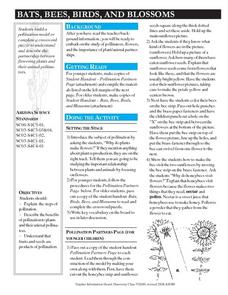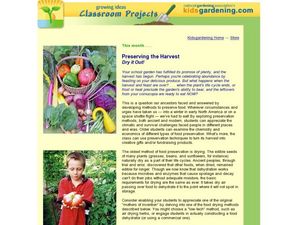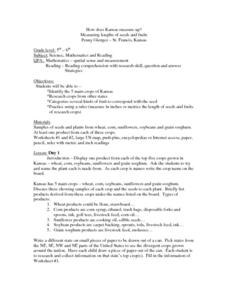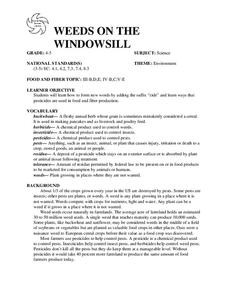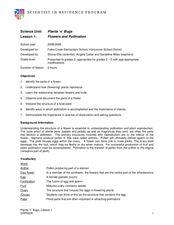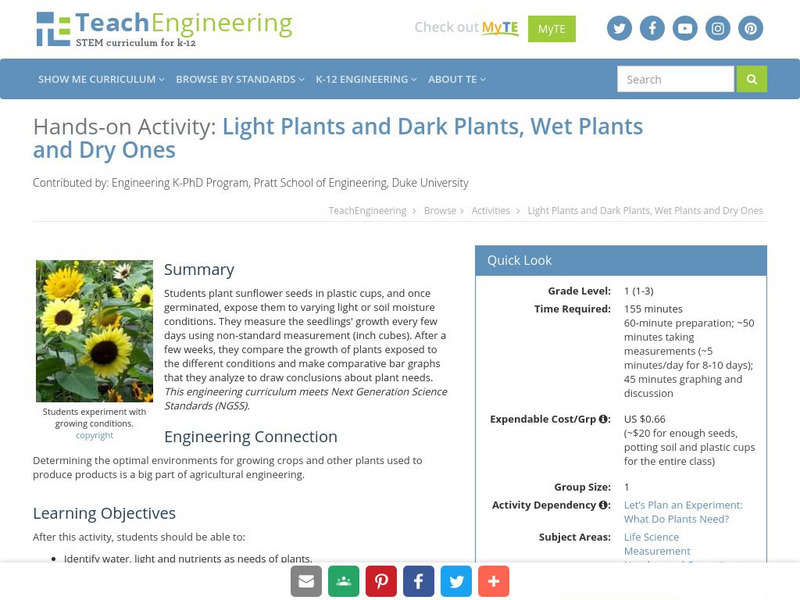Curated OER
Plant Growth
Students role play as text book creators by designing an animation showing plant growth from seed to maturity. They incorporate things that plants need to grow in the animation.
Curated OER
Who Needs What?
Students identify the physical needs of animals and if plants need the same things as animals. They conduct an experiment to see if plants need light and water to grow. They compare the growth of the plants exposed to the different...
Curated OER
Pollination Power
Second graders study and examine the structure of a flower. In this pollination lesson, 2nd graders observe pollinators in the garden and dissect a flower. Students then plant strawberry plants in the garden and observe the process of...
Curated OER
SEEDS WE EAT
Students identify seeds humans eat and do not eat. Students make seed collections, using common kitchen foods. Students display seeds from the foods they serve and discuss them with their guests. Students complete activities which...
Curated OER
Bats, Bees, Birds, and Blossoms
Youngsters use a paper bee to pollinate two paper flowers. They use hole-punch dots as pollen. Older learners dissect flowers and name the structures involved in pollination. The handouts mentioned in the lesson plan are not included, so...
Curated OER
Forest In A Jar
Students conduct an experiment using soil, water, seeds, a plant, and a jar; and then draw a poster to represent their observations and findings. They make a poster showing what happened to their aquatic environment.
Curated OER
Preserving the Harvest: Dry it Out!
Students explore how people preserved their food in the past. In food preservation instructional activity, students create different models that enable someone to dry out food, such as a food dehydrator. Students also learn how to...
Curated OER
Flower Pot Salad Bar
Students discuss the connection between a flower pot and wholesome food by creating a salad. In this healthy eating lesson, students utilize numerous fresh vegetables to create a classic salad in a flower pot. Students write the steps...
Curated OER
Flower Power
Pupils investigate and explain the basic needs and life processes of plants. Key concepts include: living things change as they grow and need food, water, and air to survive. The reverse of the Kansas quarter serves as inspiration.
Curated OER
Window Gardens
High schoolers use a plastic sandwich bag containing a damp paper towel taped to a window as a model system to observe the germination and early growth of radish seeds. They are challenged to pose a question about seed germination and...
Curated OER
Air Pollution
Students identify the causes and effects of air pollution and how to reduce air pollution.
Curated OER
Aztec Floating Gardens
Aztecs created amazing hydroponic gardens called Chinampas, to grow their crops. Learners in grades k-7 engage in four mini-experiments to understand just how amazing floating gardens are. Tip: A perfect way to bring science into your...
Curated OER
Patterns in Nature
In this patterns in nature learning exercise, students read about the Fibonacci Spiral, then follow the directions to plot one on the graph paper and draw the spiral, with links to more information.
Curated OER
How Does Kansas Measure Up?
Students identify the five main crops of Kansas and crops that are produced in other states. The categorize the types of fruits and seeds of each plant and measure each to compare the length of each.
Curated OER
Our Changing Environment-- A Demonstration
Students observe and describe changes in an environment when some of the components are changed. They recognize the process of succession by
preparing a miniaturized environment in which a variety of plants and seeds are grown.
Curated OER
WEEDS ON THE WINDOWSILL
Discuss the suffix "cide." Have students name words having this suffix (homicide, suicide, genocide). Ask students what all these words have in common. Then ask students to define the word "pesticide." (Pesticides control organisms that...
Curated OER
Weeds on the Windowsill
Students study farming and reasons to control weeds. They examine pesticides necessary for the control of weeds and the damage to the environment. Through experimentation, students plant seeds in different soils and determine if seeds...
Curated OER
Kansas vs the U.S.
Students demonstrate an understanding of the physical and political geography of Kansas. They view maps and films to gain knowledge of Kansas. They calculate the percentage Kansas harvests for each crop out of the national total.
Curated OER
One, Two, Three. TMV
Students, in groups, design their own experiments to determine how the mode of application of the virus extract affects the various plants that students have grown from seed.
Curated OER
Field Of Beans
Students investigate the concept of crop farming. They plant small fields to test different theories of agriculture. Students keep care over the fields, including pest and weed control. Students make and record daily observations to...
Curated OER
Flowers and Pollination
Students explore the environment by researching plant reproduction. For this pollination lesson, students define botany related vocabulary terms such as disc flower, petal and fertilization. Students dissect a flower with their...
Curated OER
Primary/Elementary Activity: Energy in Food
In this food energy worksheet, students rank the foods by the amount of energy they think the various food items have in them. Students then answer the 4 questions about food energy.
Curated OER
Habitats: must live with them....cannot live without them.
Students conduct an internet study regarding habitat, ecosystem, biome and the region they live in. They observe the habitat by visiting a State Park and observing the organisms in their habitat. In addition, they create their own...
TeachEngineering
Teach Engineering: Light Plants and Dark Plants, Wet Plants and Dry Ones
Students plant sunflower seeds in plastic cups, and once germinated, these are exposed to different conditions of light levels and/or soil moisture contents. During exposure of the plants to these different conditions, students measure...






